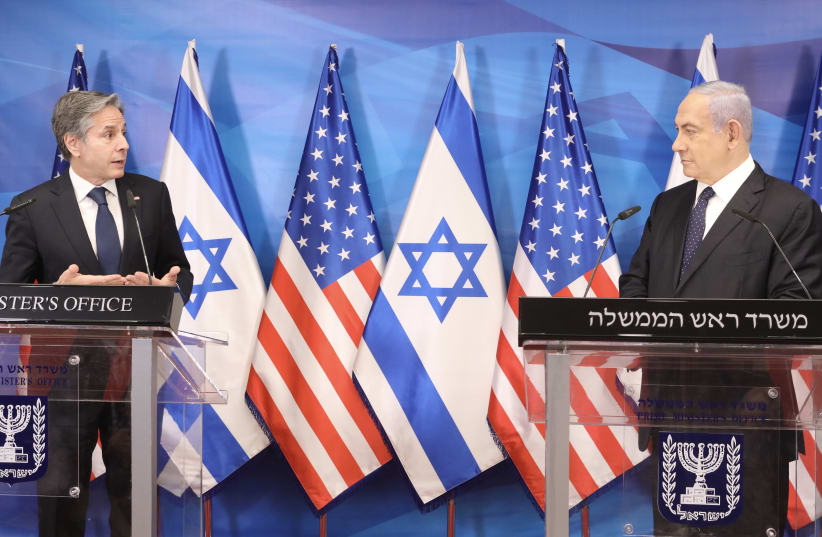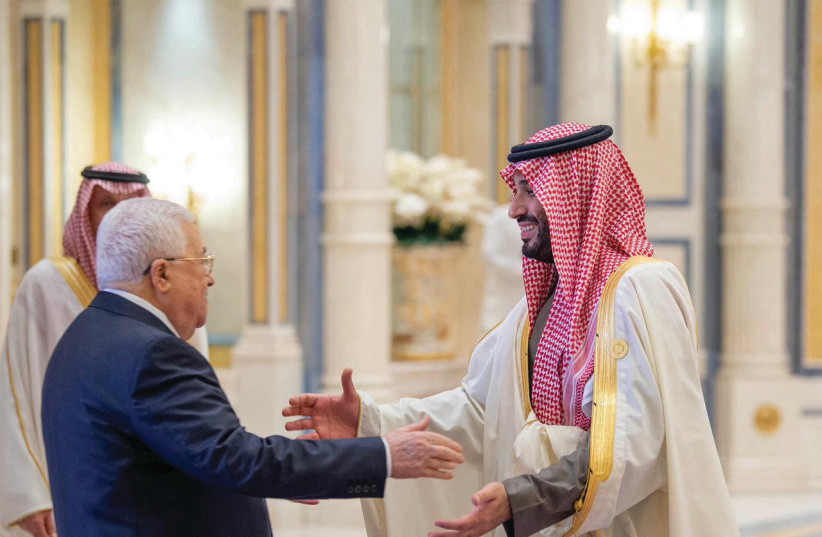US Secretary of State Antony Blinken met Saudi Arabia’s de-facto ruler, Crown Prince Mohammed bin Salman, on Monday as Hamas continued to delay its response to an initial proposal for a hostage deal that would pause the fighting in Gaza.
It was the first stop on his fifth regional trip since the start of the Israel-Hamas war on October 7, in which he will also visit Egypt, Qatar, and Israel. Qatar and Egypt are mediating the deal for the release of over 130 hostages held in Gaza.
“It’s not a coincidence that we are going to the three countries that are involved in those talks: Egypt, Qatar, and Israel,” a US official said, downplaying expectations: “Impossible to say if we’ll get a breakthrough when we’ll get a breakthrough.”
Hamas had been expected to provide Israel and its mediators with a response late last week, with high expectations that a response would come on Sunday night.
At issue has been Israel’s demand that it be allowed to continue the war, and Hamas’ insistence that any hostage deal must include a clause about a permanent ceasefire. It is broadly presumed that the proposal on the table would include a pause to the war, the staged release of the hostages held by Hamas, and Israel’s freeing of Palestinians jailed for security reasons, including terrorists with blood on their hands.
Prime Minister Benjamin Netanyahu reiterated Israel’s position at a Likud faction meeting in the Knesset on Monday, stating that “our goal is a complete victory over Hamas.”
He also threatened the terror group’s leadership: “We will kill the Hamas leadership, and so we must continue to act in all areas of the Gaza Strip. The war must not end before then. It will take time – months, not years.”
He noted that 110 of the 253 hostages seized in the Hamas-led massacre attack on October 7 had already been released. The bulk were freed in a deal at the end of November that saw a week-long pause in fighting and the release of three Palestinian security prisoners for every hostage. Those freed were women and minors, suspected or charged with minor offenses.
Netanyahu cautioned that this time around “Hamas has demands that we will not agree to. The release formula should be similar to the previous agreement.” He emphasized that a deal would not be made at any cost.
Separate from the issue of the fighting, the hostage deal and the accompanying humanitarian pause are now seen as instrumental in helping advance conversations on a normalization deal between Saudi Arabia and Israel, which had been frozen in the immediate aftermath of Oct. 7 but resumed in recent weeks.
Speaking in Davos last month, Blinken said there was “a new equation” in the Middle East, in which Israel’s Arab and Muslim neighbors were prepared to integrate Israel into the region, but needed to see a pathway to the creation of a Palestinian state.
Conversations on who would govern Gaza after the war, how the Palestinian Authority needs to be reformed to potentially rule the enclave, and obtaining security guarantees for Israel are now moving parts of the same equation, a US official has said, adding that achieving results would require compromises from both Israelis and Palestinians.
“If we get a humanitarian pause, we want to be in a position to move as quickly as possible on the various pieces of the day after – reconstruction of Gaza, PA (Palestinian Authority) reform, governance of Gaza, two states, normalization. Some of which are quite difficult and quite complex,” the official said.
Netanyahu has been at odds with the Biden administration over the creation of an independent Palestinian state, saying he would not compromise on “full Israeli security control of all territory west of the Jordan River.”
The talks are at a sensitive phase, and any progress won’t come easy, the official added.
In Saudi Arabia on Monday, Blinken’s meeting with bin Salman lasted about two hours.
He is expected to address regional escalation as Iranian-backed groups have entered the fray and fired on US forces in Iraq and Syria, while Yemen’s Houthis attacked shipping routes in the Red Sea.
The US has been carrying out retaliatory strikes on Iran-backed militias across Syria, Iraq, and Yemen in response to a drone strike last week in Jordan that killed three American troops and wounded dozens.
Blinken will nevertheless try to reinforce the message that the Biden administration neither seeks war with Iran nor wants the conflict to spread further despite calls by some opposition Republicans in Congress advocating for attacks inside Iran.
The Pentagon also said it does not believe Tehran wants war either. Iran has so far avoided any direct role in the conflict, even as it backs those militia groups.
A key priority is for Blinken to “deliver a message directly to countries in the region that the United States does not want to see the conflict escalated and will not escalate the conflict,” a senior US official told reporters en route to Riyadh.

Blinken is not alone in his journey to the Middle East
Alongside Blinken’s trip, French Foreign Minister Stephane Sejourne is also traveling in the Middle East. He was in Israel on Sunday where he met with Netanyahu, Foreign Minister Israel Katz, and opposition leader Yair Lapid. He discussed with them the potential resumption of a diplomatic process for a two-state resolution to the Israeli-Palestinian conflict.
He arrived in Israel after visiting Jordan and Egypt and is expected to visit Lebanon to help prevent a full-out war there between Israel and Hezbollah.
Katz told Sejourne that Israel won’t hesitate to act militarily to halt Hezbollah’s attacks along its northern border so that its citizens can return home.
“Time is running out to find a diplomatic solution in southern Lebanon,” he told Sejourne.
Leading international players, such as the United States, the United Kingdom, and France, have sought to work through the Lebanese government to pressure Hezbollah to withdraw from the border in keeping with United Nations Security Council Resolution 1701, which set out the ceasefire terms that ended the Second Lebanon War in 2006.
Sejourne, who met on Sunday with Egyptian Foreign Minister Sameh Shoukry, has also been calling for the release of the hostages. Three dual Israeli-French citizens are among those held in Gaza.
France had worked on an arrangement to deliver medicine to the hostages but promised proof the drugs’ delivery was never provided to Israel. Katz asked Sejourne to press Qatar for evidence of the drug’s delivery.

